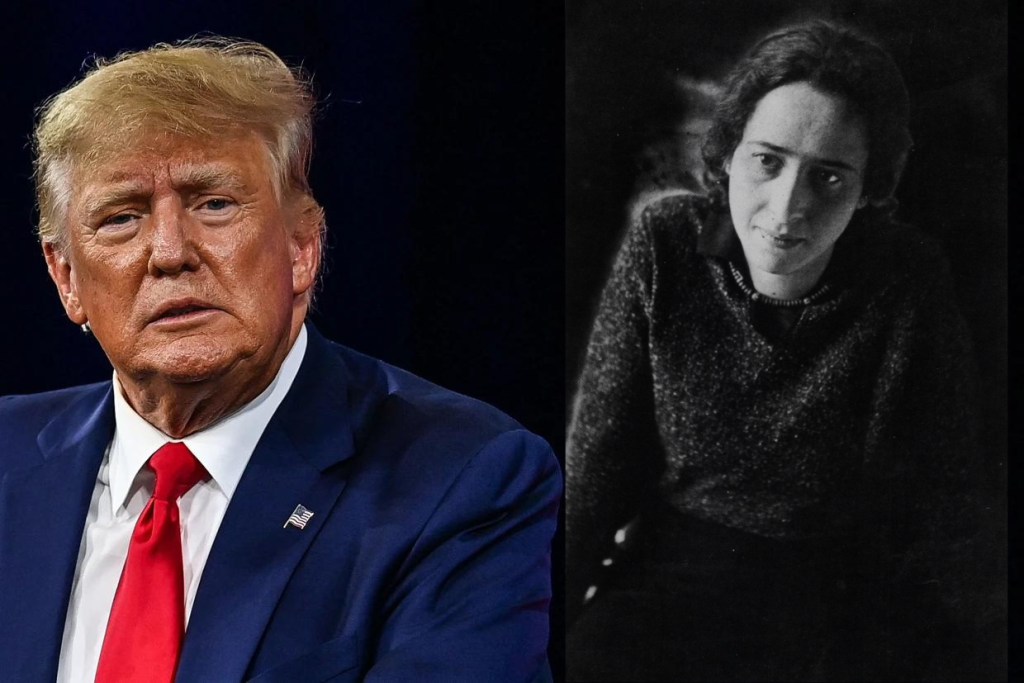Connell Fanning
How does he get so many people to believe his farrago of falsehoods and to believe them so forcefully?
Hannah Arendt explained how this phenomenon worked in the case of Adolf Hitler and it is a useful lens to view what is going on with Mr Trump.
(There is no suggestion of any moral equivalence between Hitler and Trump for all the latter’s authoritarian urges and activities.)
Hannah Arendt, reviewing a book on Hitlers’ ‘table talk’, referred to Hitler’s “unquestionable superiority over those around him and the particular quality ‘of the uncanny charisma Hitler emanated in such a commanding way’.”[1] Seeking to solve ‘the problem of Hitler’s charisma’, she suggested it was easy to solve:
“It was to a great extent identical with what [the author of the book being reviewed] calls the ‘fanatical faith this man had in himself’ and it rested on, and had rested on the well-known experiential fact that Hitler must have realized early in his life, namely, that modern society in its desperate inability to form judgments will take every individual for what he considers himself and professes himself to be and will judge him on that basis.”
She developed the point as follows:
“Extraordinary self-confidence and displays of self-confidence therefore inspire confidence in others; pretensions to genius waken the conviction in others that they are indeed dealing with a genius. This is merely the perversion of an old and justified rule of all good society according to which everyone has to be capable of showing what he is and of presenting himself in the proper light. The perversion occurs when the social role becomes, as it were, arbitrary, when it is completely separated from the actual human substance, indeed when a role consistently played is unquestioningly accepted as the substance itself.”
The consequence of this perversion was that:
“In such an atmosphere any kind of fraud becomes possible because there appears to be no one at all left for whom the difference between fraud and authenticity matters in the least. People therefore fall prey to judgments apodictically expressed because the apodictic torn frees them from the chaos of an infinite number of totally arbitrary judgments.”
For Arendt,
“The crucial point is that not only is the apodictic quality of tone more convincing than the content of the judgment but also the content of the judgment, the object judged, becomes irrelevant. Hitler’s tirades about the evils of smoking seemed to have had a no less fascinating effect on his listeners than his speeches about Napoleon l or his views on world history.”
The way is opened to idolatry:
“To assess correctly this phenomenon of charisma in Hitler’s case we have to remind ourselves that in present day society it is not really all that difficult to create an aura about oneself that will fool everyone – or just about everyone – who comes under its influence. In this respect Hitler behaved no differently than have many less talented charlatans.”
So that:
“It goes without saying that under these conditions the rule of a good upbringing that says one must not blow one’s own horn has to be ruthlessly put aside. The more that the vulgar practice of unbridled self-praise spreads in a society which for the most part still adheres to the rules of good upbringing, the more powerful its effects will be and the more easily that society can be convinced that only a truly ‘great man’ who cannot be judged by normal standards could summon the courage to break rules as sacrosanct as those of good breeding. In other words, Hitler held a far greater fascination for generals and other members of good society than he did for the ‘old fighters’ who like him, came from the mob strata of society.”
Is this not descriptive of what we are told happens with people in Mr. Trump’s orbit? Whatever the details of Mr. Trump’s early experiences, we know that he was mentored by the lawyer Roy Cohn, as unseemly an individual as could be found in New York at the time and that he has continued to wish for a replacement. We can observe that Mr. Trump has deployed the dark arts Cohn taught him well throughout his living and business dealings and into his presidency and beyond.
We have seen Mr. Trump display the extraordinary self-confidence, that Arendt says inspires confidence in others and his pretensions to genius (“I am a very stable genius”, he claimed without a hint of irony in January 2018) waken the conviction in others that they are indeed dealing with a genius.
Thus, as Arendt observed, “modern society in its desperate inability to form judgments will take every individual for what he considers himself and professes himself to be and will judge him on that basis.”
That seems as an good explanation of how Mr. Trump does it as we are likely to get. It is certainly a useful way for thinking about the phenomenon that is Donald Trump and what has been happening to political life in the United States of America in recent years.
[1] Hannah Arendt. At Table with Hitler. In Hannah Arendt, Essays on Understanding 1930 to 1954: Formation, Exile, and Totalitarianism. Edited with an introduction by Jerome Kohn, Schocken Books, New York, 1994, pages 291-292,.



